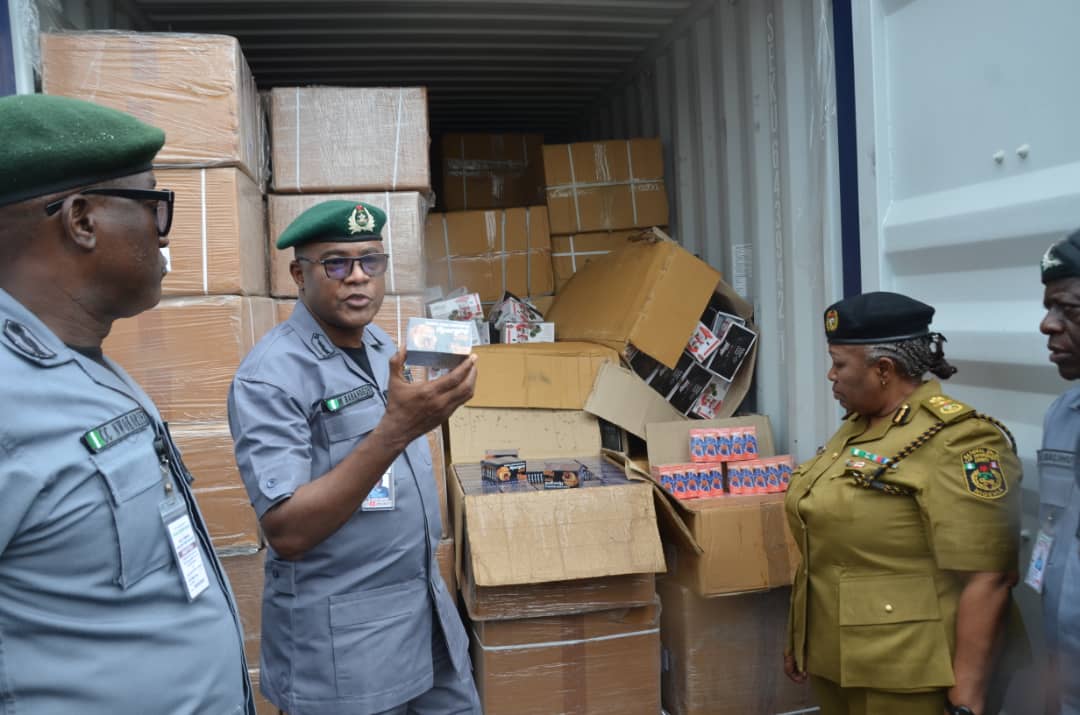Customs Report
‘Export Processes Delay Has Reduced Significantly” – Babandede

The Nigeria Customs Service Area Controller, Lilypond Export Command, Comptroller Mohammed Babandede says export processing associated delays have reduced drastically, noting also that teething challenges associated with recent efforts to re-launch the nation’s export trade is receiving improved attention in Europe and elsewhere.
Babandede expressed optimism that with the rate of accelerated export drive and focus, prospects are high that the USD200billion non oil earning target by the Nigerian Central Bank is realizable.
The export customs command boss while briefing the press yesterday in his office on the performance of the area for the first quarter, disclosed that unlike before the establishment of the Export Processing Terminals (EPTs) by the present government, only one shipment of export have been recalled.
He spoke extensively about the command’s activities, achievements and challenges. Excerpt:
BY EGUONO ODJEGBA
Tell us about your command’s mandate and some of the cardinal achievements you recorded between January and March this year.
As you know, Lilypond is the newest area command and it is a specialized export command established by the service in collaboration with the Nigerian Ports Authority as Export Processing Terminals (EPTs). Our mandate includes stuffing, examination, documentation and processing of non-oil export cargos. So far, much of the delays relating to export processing in the past have been reduced drastically. Within the first quarter, we processed a total of 118,184.96metric tons of export worth N86,426,279,070.59, with free on-board value (FOB) of $204,656,119.04.
You talked about reduction in delays as your major achievement, can you explain better?
Imagine sesame seeds or hibiscus flower, if they are locked in a container before the voyage for 30 days, and they are going overseas, what will happen? So by the time it gets to its destination, most of these things would have started to decompose. Another challenge is rejection and return of our products which is caused by the delay. Apart from that, some of these exporters don’t abide by the regulations like the fumigation standard which is done by the federal produce, the phytosanitary certificates which certify the product as fit for human consumption. So if the container gets to that place without this certification, it will be rejected and returned, which will be a minus to the exporters and also to the image and credibility of Nigeria. You could remember there was a time our beans was returned from Europe, after which they don’t even accept beans coming from Nigeria. Why? Because one exporter out of many used sniper, which is a very dangerous chemical to fumigate his container of product.
What are the other advantages of the designated export terminal?
I have said export processing delays are reduced. This leads to efficiency because we operate a one-stop-shop where all agencies are domiciled; we collectively examine and release export direct to the ship.
In your presentation, you didn’t mention the impact of what the Nigerian Export Promotion Council has done to support you in any way. Do you have any interface with them?
It was an omission, Export Promotion Council, the whole idea of even export processing and timeliness like this being demonstrated by the Nigerian Customs, also the Nigerian Ports Authority, Nigerian Export Promotion Council, PEBEC, that’s office of the Vice President and some others. They came up with this idea of there should be an export based port, whereby there will not be issues, there will not be problems along the way. There will not be even congestion within the terminal inside the port. They recommended the displacement of fiber export boxes inside the port should be used for import that export should be treated outside where it is treated, processed, then sent to the mother port for sail. We really worked closely with the Council.
You talked about the domestic export warehouse, can we liken your command to the domestic export warehouse or are they something different from what we have here?
There are domestic export warehouses where they conduct examination. We and the other agencies, we go there, the number of domestic export warehouses in the south west are about six or seven or so each zone. If they have anything, direct application, we do directly.

So you don’t have officers there?
No, we don’t.
What has been the issues since you came on board? In the process of the escort of some of these products outside the port here, have you been able to get hold of anybody that wants to export items not approved by government to leave the port?
W e are just a new command, we just started operation three months ago. Although the terminal was commissioned in November, we are trying to stabilize and ensure that everything goes well, because this is not the only place where we (customs) treat export. This place serves as a hub, it also serves as a pre-gate. There are five places where we have export loading, so most of these guys even if they have nothing, they will not come. For now, we don’t have any, all the foods that came are either the agro produce or the natural harvests.
We understand this terminal is going to be linked with rail, when are we going to have that. And as a new command, what are the challenges you have?
We have five approved export processing terminals, for any container that is accessing the port using the land corridor, we use Diamond Star, that is why you are seeing trucks. There are other terminals that are in water front, if you are using the barge, Apapa, Tin Can, PTML. There are other terminals because here we don’t have water, if you are using rail, we go to the Iddo Railway Terminal, you see the rail connecting only to APMT, it does not go to Tin Can, so if you have products for rail, you tell us, we go there and inspect it, and it goes to APMT. For challenges, they are the issues which I said earlier, which we have been able to handle. As we are progressing we will meet challenges and will be addressing them, at times we will engage the stakeholders so that together, we address some of the challenges.
After NPA commissioned this export terminal in November, we got to a point that among this command and some other commands, there were issues about where the export goods should go to, is it Tin Can, is Apapa or here? Have you been able to iron out this issue with those mother seaports?
These are issues we are fine-tuning, but in order not to cause chaos we are treating Tin Can, Apapa and others, but I know as we progress, the authority should be able to say ‘okay, since this place is meant for export only…we don’t do anything apart from export, all exports should go…(there), but we are testing for now to see how it’s going to be.
Can you also let us know the trade volume, you talked about export of cocoa and all that, what are the volumes exported within this period, as per the various items?
Maybe later we can give you the individual breakdown but really, the major product we export is cocoa followed by cashew nuts, ginger, then sesame. Then there is hibiscus flower, soya beans, the last one… Then we have the natural oil. This country is blessed with natural resources. We are just sitting down atop stuffs, maybe you have your building and houses where cool is, natural resources everywhere, some we don’t even know. What we have can feed Africa.
You talked about export shipment of beverages produced here, where are they exported, Europe, Asia or within our sub region?
Mostly here, most of these things like domestic. I have sent some of my officers to go to these country and see, Senegal and all these places, some of these things that we are taking for granted. Some of the cosmetics we produce here go far and wide, some goes to as far as Angola.
As a designated export terminal, which of the seaports are you servicing or is it any port? Will an exporter who wants his goods out through Apapa or Tin Can still come here? I ask this question in view of the revenue generation duty by the various commands.
Lilypond Terminal is universal, when l say universal, it means if you are going to TICT, Five Star Logistics, APMT, Grimaldi (PTML), whichever Ex Form you are using, we can release your export from here. That is why it is called the export command. All export accessing Lagos ports should be processed and ready for export. Consignments released go straight to any of the ports, the choice is the exporter’s, which line is he using to export his products?
Are duty officers assigned to escort processed exports and, or, will there be another examination to be conducted at the receiving port?
That’ was why I said we have been able to reduce the time lag, consignment released from here is final, it is not only customs that is here, the NDLEA here, we have DSS here, we have NAFDAC, we have Produce here, no other agent of these organizations will intervene. Once it is treated and is coming from here, it goes straight to the ship. And I’m telling you, this country has the potential to be one of the best economy, not just in Africa, but all over the world. We have the land that can feed the whole of Africa, we can grow so many things. Ivory Coast that is number one in cocoa export is not more than maybe the south western states. We can do more than that even on cocoa. And now the CBN also has come up with another export scheme, by the time you are producing, you are able to add value to it. For every dollar that is repatriated back to Nigeria, you get about N35, if you should convert these raw products to semi finish products every quarter, you get N35 per each dollar. And the CBN is also expecting with the collaboration of customs, that at least in the next three to five years, there should be repatriation of about $200 billion. And I believe we can do that, we can do that on this products, even we can do more if we can reduce the number of spoilage along the way, right from the farm to warehousing, to the storing area, and to the port. If we can reduce the number of storage and we can do more by getting more of the seeds, the more improved varieties, and maybe more fertilizer. We will continue to talk to the farmers, to mechanize their farming, we can do better. And we can add value like this hibiscus instead of us exporting it raw, we can do some real packaging and change it either to tea or to something, then export it over there. You will get money from the CBN for repatriation and you will have more value and more money and you create employment opportunities , thereby reducing the social problem of the country.

































